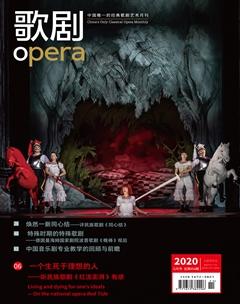后疫情时代的歌剧(五)
Joanna C.Lee

小瓊:自全球爆发新冠肺炎疫情以来,在这段特殊时期里中国可谓是上演完整规格歌剧制作的先锋。我也很高兴地向大家分享:日本最近也把一部完整规格的歌剧《末日之梦》搬上舞台。这部歌剧由藤仓大(日本作曲家,现居伦敦)作曲,哈里·罗斯作词;此次世界首演则由琳达·施泰尔导演,东京新国立剧场歌剧艺术总监大野和士指挥。
小薇:乐团、合唱团、独唱家这么多人同时参加排练,加上佩戴口罩、保持社交距离以及隔离等种种防疫政策,排练期一定漫长而又复杂。我看到照片上大家在排练的时候都戴着口罩——无论是指挥家、独唱家还是乐团、合唱团成员,或是后台工作人员,皆如此。
小琼:《末日之梦》是在赫伯特·乔治·威尔斯1901年所作故事的基础上创作的,故事讲述了人性与战争、危险与逃离、梦境与真实中的种种不确定性。尽管威尔斯创作这部小说的时间是一个多世纪以前,但其中所蕴含的现代性——衍生自两位陌生人在列车上一小时旅途期间的对话——显然与今天的世界相关。
小薇:新冠疫情以前,陌生人尚且有可能在列车上讲话,但目前情况下我就不敢保证了。之前在东京新国立剧场的网站上看到,藤仓和罗斯是长期合作伙伴,合作超过20年,而他们一直以来都梦想着创作一部有着列车场景的歌剧。
小琼:确实。哈里·罗斯从小就阅读威尔斯的作品,但直到藤仓和他提起,他才知道这个故事。藤仓在接到东京新国立剧场的委约的时候(早在2017年),他立刻想到了《末日之梦》,正是因为这个列车上的场景!
小薇:将小说改编成歌剧需要极强大的功力。资料写道,两位创作者将开幕设计为一段阿卡贝拉合唱。实际上合唱团成员不单单扮演了(前几幕当中)乘客的角色,之后也充当了军队中的士兵。
小琼:歌剧制作始终是复杂的。正如我先前提到的,美国、英国、澳大利亚、德国的许多艺术家远道而来,与日本本土的音乐家合作。琳达·施泰尔导演也召集了出色的制作团队——他们都是当代歌剧的资深行家,2016年在巴塞尔合作制作了卡尔海因兹·施托克豪森的史诗《光》之《星期四》,赢得了当年《歌剧世界》杂志的“年度制作”奖项。
Joan: China has been leading the world in fullystaged productions, and Im so glad to share the news that Japan just presented a new fully-staged opera, A Dream of Armageddon. Composed by Dai Fujikura (a Japanese composer now living in London) with libretto by Harry Ross, this world premiere was directed by Linda Steier and conducted by the New National Theater Tokyos Artistic Director of Opera, Kazushi ōno.
Valery: With an orchestra, chorus and soloists, the rehearsal period must have been long and complicated, given all the policies on mask-wearing, social distancing and quarantines. I see from photos that everyone was wearing a mask in rehearsal—from conductor to soloists, orchestra to chorus, as well as backstage personnel.
Joan: A Dream of Armageddon is based on a 1901 story by H.G. Wells touching on the uncertainties of humanity and war, of danger and escape, of dream and reality. Although Wells wrote this story more than a century ago, the sense of modernity—deriving from a conversation between two strangers on an hourlong train ride—is clearly relevant to todays world.
Valery: Before the COVID pandemic, it was possible that strangers would speak on a train. I doubt this could happen today. However, I read on the New National Theatre Tokyos website that Fujikura and Ross have been longtime collaborators for two decades, and theyve always dreamt of setting an opera on a train.
Joan: Indeed, Harry Ross read H.G. Wells from a young age. But he wasnt aware of this story until Fujikura mentioned it to him. When Fujikura received the commission from the New National Theatre Tokyo (as early as 2017), he immediately thought of A Dream of Armageddon because of the train scene!
Valery: Adaptation requires tremendous skill. I read that the composer and librettist open the opera with a cappella chorus. In fact, members of the chorus not only play the roles of train commuters (in the early scenes) but also later on, as soldiers in an army.
Joan: Opera productions are always complex. As I mentioned earlier, musicians normally resident in Japan are joined by artists flying in from America, England, Australia and Germany. Director Linda Steier assembled an amazing production team too—veterans of contemporary opera who worked together in Basel in 2016, in Karlheinz Stockhausens epic Donnerstag aus Licht, which won Opernwelts Production of the Year.

